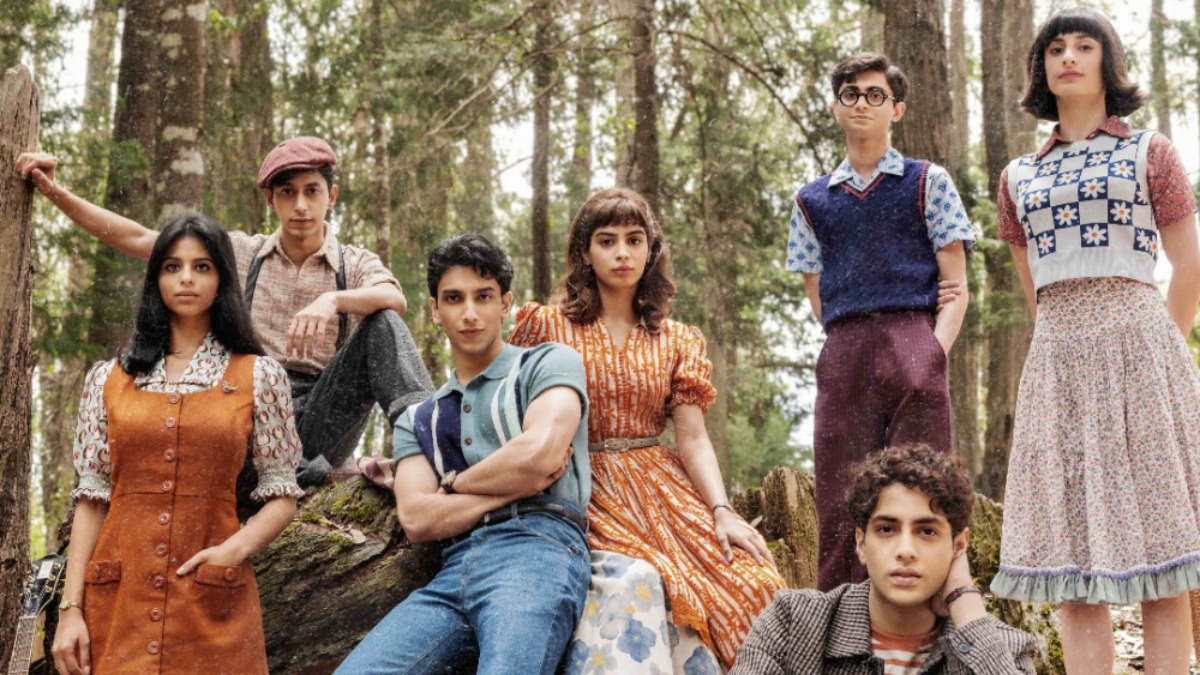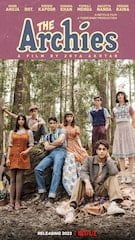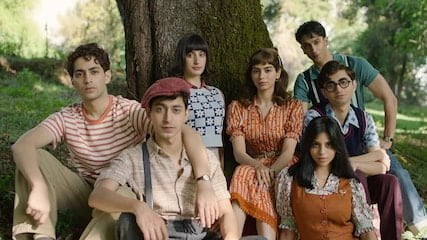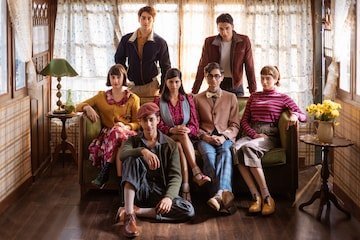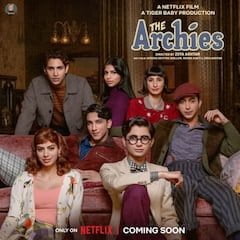Written by Zoya Akhtar, The Archies is a musical adaptation of the well-known Archie comic series. The narrative, which takes place in the charming but made-up hill town of Riverdale, recounts the tale of a few teenagers who attempted a small-scale rebellion in 1964.
The film explores contemporary issues such as corporate greed, press freedom, queer rights, gender politics, and nature activism.
With a focus on a group of Anglo-Indian teenagers, Archie Andrews, Betty Cooper Veronica Lodge, Reginald Mantle, Jughead Jones, Ethel Muggs, Dilton Doiley and Moose, the film takes us through their lives when they face a significant challenge when wealthy businessman Hiram Lodge plans to destroy their beloved Green Park and build a hotel. Despite facing resistance, Veronica, his daughter, her friends, and others start an advocacy campaign to stop the construction. The film explores contemporary issues such as corporate greed, press freedom, queer rights, gender politics, and nature activism.
On the other hand, Akhtar created a visually appealing world to narrate the tale, wherein all problems are resolved with a hug, a slice of cake, or an honest apology. It resembles a utopian society that attempts to address contemporary issues in a way that seems so far from reality.
The portrayal of capitalism and greed in The Archies
The main component of the story of The Archies makes for some intriguing perspectives on contemporary issues. Very soon after the beginning, as a subplot, the movie turns into an explanation of how capitalism and privatisation operate and candidly portrays what happens when corporate interest and public interest come into conflict against one another and how the former prevails.
It explores the dark side of “corporate culture” and demonstrates how larger companies may acquire smaller ones, how political spaces may be bought off by corporate lobbyists, making “democratic processes” useless; or how press freedom turns into a farce when it needs to consider the business interests of the company that controls the media spaces.
The politics of The Archies
The Archies has a charming exterior, but when it comes to politics as one delves deep into the film, it falls flat. Though the movie makes a feeble attempt to convey complexity, it does not appear to want viewers to look past the obvious.
Throughout the plot, The Archies challenges the immorality of capitalism by using the businessman Hiram Lodge’s line, ‘It’s business. It is not a personal matter.’ We see how a seventeen-year-old Ronnie Lodge, his daughter, believes in that too until she realises the need to fight against it. The movie portrays Archie (Agastya Nanda) who is seen as very ignorant, who declares he has no interest in politics, and says it does not bother him if he is not affected, reflecting the people in the society who are ignorant towards contemporary issues from a position of privilege. The film shows how Archie evolves into someone who thinks everything is political, and gender, environment and all aspects of life are political and how it can affect everyone in different spheres of life.
However, the film makes no mention of the social and political problems that were causing turmoil in India at the time, such as the fallout from the war with China, the slowdown in economic expansion and the increase in unemployment, the frequently violent language protests and so on, which makes the audience ask the question: did the maker specifically choose to filter things while portraying the 1960s?
But The Archies‘ most troubling element could be its nostalgia with references to The Beatles, Mohammed Rafi, Freddie Mercury, and Shammi Kapoor, from the 1960s. They are all mentioned several times throughout the movie. The characters even wear miniskirts, curl their hair, and drive around in Ambassador cars to stay true to the period. However, the film makes no mention of the social and political problems that were causing turmoil in India at the time, such as the fallout from the war with China, the slowdown in economic expansion and the increase in unemployment, the frequently violent language protests and so on, which makes the audience ask the question: did the maker specifically choose to filter things while portraying the 1960s? Why use nostalgia if the true past is not shown?
In The Archies the charming nerd Dilton played by Yuvraj Menda depicts a closeted queer person in a small town in the 1960s. In the scene where he breaks down at the verge of vulnerability while attempting to talk about it, we see a conversation that takes place with his crush Reggie played by Vedang Raina. Reggie talking to him as an ally and as a friend is a beautiful and appreciable scene.
The Archies also highlight how Anglo-Indians transcend the misconceptions about their Western cultural norms and tastes in art. It serves as a reminder that when we look at communities through such a restrictive lens, we frequently fail to see the whole picture of diversity.
Ultimately, the musical adaption embraces environmental politics and calls out the capitalistic power but The Archies lacked enough depth or sentimentality in reaching the audience.
Although Akhtar tries to strike a balance between business and environmental issues, the film’s politics never seem to make the point.
There Is nothing ‘cutesy’ In two-timing
The subplot of The Archies as the story progresses, takes the audience through friendship and teenage romance where Archie is seen leading on two of his friends (who are best friends too), in a love triangle. He is portrayed as a confused teenage boy who cannot choose between either of the other characters which is a nascent version of typical playboy behaviour. When his friend asks him to not make things complicated by going for both his friends, he immediately goes for another girl.
In this instance, Ronnie (Suhana Khan) and Betty (Khushi Kapoor) voluntarily chose their friendship above a guy which is a rare sight in many Bollywood contemporary films.
The tension that exists between Veronica and Betty—two characters who have their eyes set on Archie—is well-known in the Archie comics. This tired plot of women battling over a boy gets a welcome feminist twist from Akhtar which is appreciable when they realise Archie’s actions affect their emotions. In this instance, Ronnie (Suhana Khan) and Betty (Khushi Kapoor) voluntarily chose their friendship above a guy which is a rare sight in many Bollywood contemporary films. Rather, Archie’s playboy traits are explored by Akhtar over a few songs. However, in the end, his actions are justified with the corny claim that he is a “dil phenk” as the film brushes past the environmental causes.
Yes, they are seventeen in the film. But portrayed as a group of people understanding the depth of friendship and environment, he should be able to respect emotions and act maturely. How the character of Archie slides away from addressing his behaviour until the movie focuses on the environmental issues completely is unsettling. The second half picks up steam, diverting the focus only to how the dispersed teens band together to preserve their beloved Green Park.
What does The Archies serve?
The Archies explores a wide range of emotions and ideas, but it does not particularly tackle complex contemporary issues in a meaningful way.
It matters how one releases a film that slavishly wraps nostalgia in a social responsibility ribbon, reflecting how corporate greed appropriates important discourses on gender, class, and global warming. This is especially true if the film’s purpose is to educate viewers about the subjects it tackles rather than merely being a musical adaptation for entertainment.
But in the end, although a superficial one, the film gives hope that despite being viewed as a minority, one may use the power of community to effect positive change. Just as the bunch of teenagers managed to rescue their beloved park filled with memories, anybody can bring a change with collective efforts.
